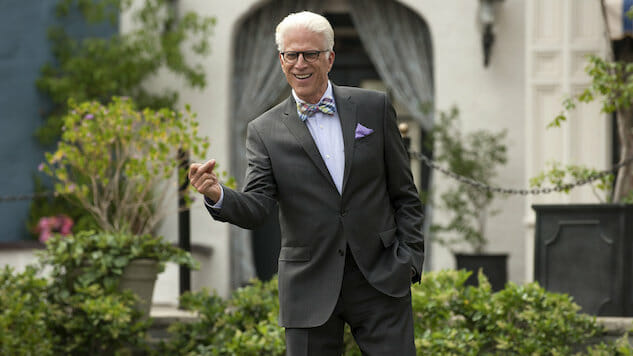The Good Place Is the Perfect Metaphor for the Sitcom Genre Itself
Photo: Colleen Hayes/NBC TV Features The Good Place
Spoilers ahead: Do not read further if you haven’t finished Season One of The Good Place.
There’s a fine line between divine intervention and cosmic manipulation—the same one, perhaps, marking the boundary dividing heaven and hell. The Good Place, a surprisingly pleasant hit from NBC now in its second season, treads playfully along that very threshold; in its first season, Eleanor (Kristen Bell) dies and, in a case of mistaken identity, finds herself in a tranquil, suburban version of the afterlife, where every detail, down to who she will spend eternity with, is tailored specifically to her personality and what she achieved while alive on Earth. As the story progresses and she meets new friends and possible love interests, it culminates in a shocking revelation: Eleanor and her gang of imperfectly perfect misfits aren’t actually in the Good Place. They’re in an experimental program designed to creatively punish them for all eternity by placing them in intricately manufactured scenarios with other people who will drive them crazy, prompted to torture each other so their tormentors don’t have to do it for them. It’s the Allegory of the Long Spoons, in a digestible TV format.
The role of Michael (Ted Danson) is not unlike a sitcom writer. In The Good Place, he acts as the omnipotent hand of fate steering our seemingly perfect but lovably flawed antiheroes have into unlikely situations primed for drama. Like a sitcom, no matter how ideal the situation may seem, various flaws and quirks will result in conflict. Any real change or character growth can be wiped out in a flash, with the turnover of a single episode. Their fates, and any development or personal growth, are subject to the whims of this creator. Whether they progress, as shown by Michael’s willingness to wipe their memories and start anew when the programs fails, is almost entirely out of their hands. They drift in a state of limbo for the amusement of an unseen audience.
Michael’s direction of the characters’ fates can be likened to the Producer, a god-like figure orchestrating the elaborate lie behind Truman’s isolated, and fully televised life, in the movie The Truman Show. And in both that film and The Good Place, the protagonist’s desire for the agency drives a self discovery that may ultimately lead to an existence free and independent of an outside authority. In that sense, it also becomes a metaphor for spiritual awakening.
As Eleanor’s awareness of the Good Place’s true nature grows, her path can be seen as an attempt to subvert the formula of suffering in both her hellish afterlife and the sitcom itself. While the characters, as a product of the written word, cannot defy the will of their creator, their creator can defy the rules of sitcom. As the show is only in the early stages of its second season, whether Eleanor and Chidi (William Jackson Harper) and Tahani (Jameela Jamil) and Jianyu (Manny Jacinto) ever find redemption and break the cycle remains yet to be seen. But if the show’s subversion of the formulaic machinations of the genre we’ve seen so far are indication, I believe they will.
The Good Place airs Thursdays at 8:30 p.m. on NBC.
Holly Green is the assistant editor of Paste Games and a reporter and semiprofessional photographer living in Seattle, WA. She is also the author of Fry Scores: An Unofficial Guide To Video Game Grub. You can find her work at Gamasutra, Polygon, Unwinnable, and other videogame news publications.